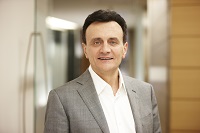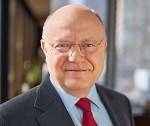 |
| AstraZeneca CEO Pascal Soriot |
One year ago, Pfizer ($PFE) finally bowed out of the fight to buy AstraZeneca ($AZN). The hostile bid was, well, quite hostile. And ever since, both companies have operated in the shadow of that failed deal.
How have they fared? That's the question the Financial Times asks, and on balance, the answer seems to favor Pfizer.
Recall that AstraZeneca CEO Pascal Soriot promised shareholders $45 billion in revenue by 2023. Since then, Soriot has backpedaled a bit, even saying that the company would be lucky to hit that number.
That's partly because AstraZeneca is still facing major sales losses to generics; it's looking for a mid-single-digit decline in 2015 sales, and a trough year in 2017. And it's partly because its pipeline may or may not pay off as hoped.
Just consider brodalumab, the anti-inflammatory drug AstraZeneca has been developing with Amgen ($AMGN). Friday, Amgen said it had dropped out of that partnership, citing worries about suicidal thinking in clinical trial patients. With several IL-17 meds as potential competitors, brodalumab could now face a steeper climb for market share--and may fall short of the $600 million in annual sales Citi thought it could deliver.
Meanwhile, AZ's stock now sits at £43.73 per share, the FT points out, compared with Pfizer's rejected £55-per-share buyout offer.
On the other hand, Pfizer's stock has risen by 16% over the past 12 months, the newspaper calculates, and its prospects for new drugs look better stocked than it did then. For instance, Pfizer cut a development deal with Merck KGaA on its cancer immunotherapy, and the FDA gave a lickety-split approval to Ibrance, the breast cancer drug that analysts expect to hit $13 billion in peak sales.
 |
| Pfizer CEO Ian Read |
After the AstraZeneca failure, Pfizer CEO Ian Read went back to his previous plan to buy back $12 billion in shares, all the while talking up a potential breakup in 2017. Pfizer agreed to pay $17 billion for Hospira ($HSP), in a deal that will build up the company's established products business with generic injectables and biosimilars.
Plus, analysts and investors appear to be thinking that Read has another transformative deal coming--perhaps another tax inversion prospect. GlaxoSmithKline ($GSK)? Actavis ($ACT)? Anybody's guess at this point. In any case, Read and his team have said that Pfizer is scouting for deals large and not so large, and any buys would be part of the long-term goal of weighing a breakup--the go big to get small idea. If Pfizer can pull all of that off by 2017--AZ's trough year--then all eyes will be on Soriot for evidence that his go-it-alone strategy is truly leading somewhere.
- see the FT story
Special Report: Top 15 pharma companies by 2014 revenue - Pfizer - AstraZeneca - GlaxoSmithKline